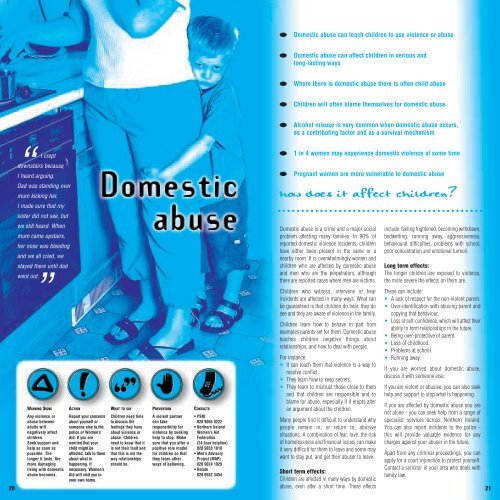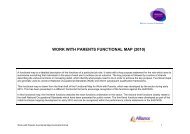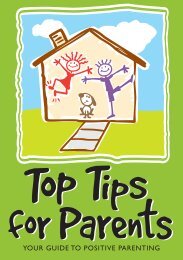Safe Parenting Handbook (PDF 1.07 Mb) - Department of Health ...
Safe Parenting Handbook (PDF 1.07 Mb) - Department of Health ...
Safe Parenting Handbook (PDF 1.07 Mb) - Department of Health ...
- No tags were found...
Create successful ePaper yourself
Turn your PDF publications into a flip-book with our unique Google optimized e-Paper software.
WARNING SIGNSDomestic abuse can teach children to use violence or abuseDomestic abuse can affect children in serious andlong-lasting waysWhere there is domestic abuse there is <strong>of</strong>ten child abuseChildren will <strong>of</strong>ten blame themselves for domestic abuseAlcohol misuse is very common when domestic abuse occurs,as a contributing factor and as a survival mechanism“I creptdownstairs becauseI heard arguing.Dad was standing overmum kicking her.I made sure that my1 in 4 women may experience domestic violence at some timePregnant women are more vulnerable to domestic abusehow does it affect children?sister did not see, but20we still heard. Whenmum came upstairs,her nose was bleedingand we all cried, westayed there until dadwent out.”Any violence orabuse betweenadults willnegatively affectchildren.Seek support andhelp as soon aspossible. Thelonger it lasts, themore damagingliving with domesticabuse becomes.ACTIONReport your concernsabout yourself orsomeone else to thepolice or Women’sAid. If you areworried that yourchild might beaffected, talk to themabout what ishappening. Ifnecessary, Women’sAid will visit you inyour own home.WHAT TO SAYChildren need timeto discuss thefeelings they haveabout violence orabuse. Childrenneed to know that itis not their fault andthat this is not theway relationshipsshould be.PREVENTIONA violent partnercan takeresponsibility forviolence by seekinghelp to stop. Makesure that you <strong>of</strong>fer apositive role modelfor children so thatthey learn otherways <strong>of</strong> behaving.CONTACTS• PSNI028 9065 0222• Northern IrelandWomen’s AidFederation(24 hour helpline)028 9033 1818• Men’s AdvisoryProject (MAP)028 9024 1929• Relate028 9032 3454Domestic abuse is a crime and a major socialproblem affecting many families. In 90% <strong>of</strong>reported domestic violence incidents, childrenhave either been present in the same or anearby room. It is overwhelmingly women andchildren who are affected by domestic abuseand men who are the perpetrators, althoughthere are reported cases where men are victims.Children who witness, intervene or hearincidents are affected in many ways. What canbe guaranteed is that children do hear, they dosee and they are aware <strong>of</strong> violence in the family.Children learn how to behave in part fromexamples parents set for them. Domestic abuseteaches children negative things aboutrelationships, and how to deal with people.For instance:• It can teach them that violence is a way toresolve conflict.• They learn how to keep secrets.• They learn to mistrust those close to themand that children are responsible and toblame for abuse, especially if it erupts afteran argument about the children.Many people find it difficult to understand whypeople remain in, or return to, abusivesituations. A combination <strong>of</strong> fear, love, the risk<strong>of</strong> homelessness and financial issues can makeit very difficult for them to leave and some maywant to stay put, and get their abuser to leave.Short term effects:Children are affected in many ways by domesticabuse, even after a short time. These effectsinclude: feeling frightened, becoming withdrawn,bedwetting, running away, aggressiveness,behavioural difficulties, problems with school,poor concentration and emotional turmoil.Long term effects:The longer children are exposed to violence,the more severe the effects on them are.These can include:• A lack <strong>of</strong> respect for the non-violent parent.• Over-identification with abusing parent andcopying that behaviour.• Loss <strong>of</strong> self-confidence, which will affect theirability to form relationships in the future.• Being over-protective <strong>of</strong> parent.• Loss <strong>of</strong> childhood.• Problems at school.• Running away.If you are worried about domestic abuse,discuss it with someone else.If you are violent or abusive, you can also seekhelp and support to stop what is happening.If you are affected by domestic abuse you arenot alone - you can seek help from a range <strong>of</strong>specialist services across Northern Ireland.You can also report incidents to the police -this will provide valuable evidence for anycharges against your abuser in the future.Apart from any criminal proceedings, you canapply for a court injunction to protect yourself.Contact a solicitor in your area who deals withfamily law.21






